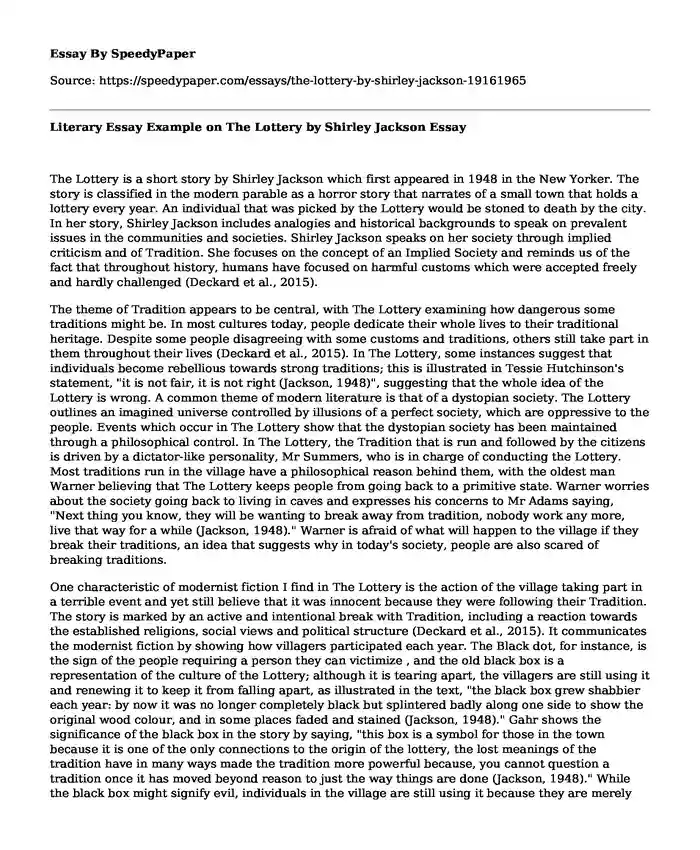
| Type of paper: | Essay |
| Categories: | Shirley Jackson The Lottery |
| Pages: | 3 |
| Wordcount: | 748 words |
The Lottery is a short story by Shirley Jackson which first appeared in 1948 in the New Yorker. The story is classified in the modern parable as a horror story that narrates of a small town that holds a lottery every year. An individual that was picked by the Lottery would be stoned to death by the city. In her story, Shirley Jackson includes analogies and historical backgrounds to speak on prevalent issues in the communities and societies. Shirley Jackson speaks on her society through implied criticism and of Tradition. She focuses on the concept of an Implied Society and reminds us of the fact that throughout history, humans have focused on harmful customs which were accepted freely and hardly challenged (Deckard et al., 2015).
The theme of Tradition appears to be central, with The Lottery examining how dangerous some traditions might be. In most cultures today, people dedicate their whole lives to their traditional heritage. Despite some people disagreeing with some customs and traditions, others still take part in them throughout their lives (Deckard et al., 2015). In The Lottery, some instances suggest that individuals become rebellious towards strong traditions; this is illustrated in Tessie Hutchinson's statement, "it is not fair, it is not right (Jackson, 1948)", suggesting that the whole idea of the Lottery is wrong. A common theme of modern literature is that of a dystopian society. The Lottery outlines an imagined universe controlled by illusions of a perfect society, which are oppressive to the people. Events which occur in The Lottery show that the dystopian society has been maintained through a philosophical control. In The Lottery, the Tradition that is run and followed by the citizens is driven by a dictator-like personality, Mr Summers, who is in charge of conducting the Lottery. Most traditions run in the village have a philosophical reason behind them, with the oldest man Warner believing that The Lottery keeps people from going back to a primitive state. Warner worries about the society going back to living in caves and expresses his concerns to Mr Adams saying, "Next thing you know, they will be wanting to break away from tradition, nobody work any more, live that way for a while (Jackson, 1948)." Warner is afraid of what will happen to the village if they break their traditions, an idea that suggests why in today's society, people are also scared of breaking traditions.
One characteristic of modernist fiction I find in The Lottery is the action of the village taking part in a terrible event and yet still believe that it was innocent because they were following their Tradition. The story is marked by an active and intentional break with Tradition, including a reaction towards the established religions, social views and political structure (Deckard et al., 2015). It communicates the modernist fiction by showing how villagers participated each year. The Black dot, for instance, is the sign of the people requiring a person they can victimize , and the old black box is a representation of the culture of the Lottery; although it is tearing apart, the villagers are still using it and renewing it to keep it from falling apart, as illustrated in the text, "the black box grew shabbier each year: by now it was no longer completely black but splintered badly along one side to show the original wood colour, and in some places faded and stained (Jackson, 1948)." Gahr shows the significance of the black box in the story by saying, "this box is a symbol for those in the town because it is one of the only connections to the origin of the lottery, the lost meanings of the tradition have in many ways made the tradition more powerful because, you cannot question a tradition once it has moved beyond reason to just the way things are done (Jackson, 1948)." While the black box might signify evil, individuals in the village are still using it because they are merely following Tradition.
The Lottery demonstrates how strong some human traditions are and how most people are committed and faithful to their harmful traditions. Despite the dark story in The Lottery, the author still has some hope; some villagers have abandoned The Lottery, and the town might change due to these few people although the changes might not be fast and easy.
References
Deckard, S., Lawrence, N., Lazarus, N., Macdonald, G., & Mukherjee, U. P. (2015). Combined and Uneven Development: Towards a New Theory of World-Literature (Vol. 17). Oxford University Press.
Jackson, S., (1948). The Lottery. The New Yorker, 26, 25-28.
Cite this page
Literary Essay Example on The Lottery by Shirley Jackson. (2022, Feb 18). Retrieved from https://speedypaper.net/essays/the-lottery-by-shirley-jackson-19161965
Request Removal
If you are the original author of this essay and no longer wish to have it published on the SpeedyPaper website, please click below to request its removal:
- Free Essay: Different Standards and Expectations from Sons and Daughters
- Learner Autonomy Research, Free Essay Sample
- Free Essay on Healthcare Start-up Budget: Heart Treatment Services to Women
- Free Essay on the Role Religion Plays in the Life of Individuals within Society: Ushpizin Film
- Essay Sample: My Evaluation for Future Leadership
- Essay Example on Postgraduate Study in Law
- Free Essay Example - Craft of Writing
Popular categories




